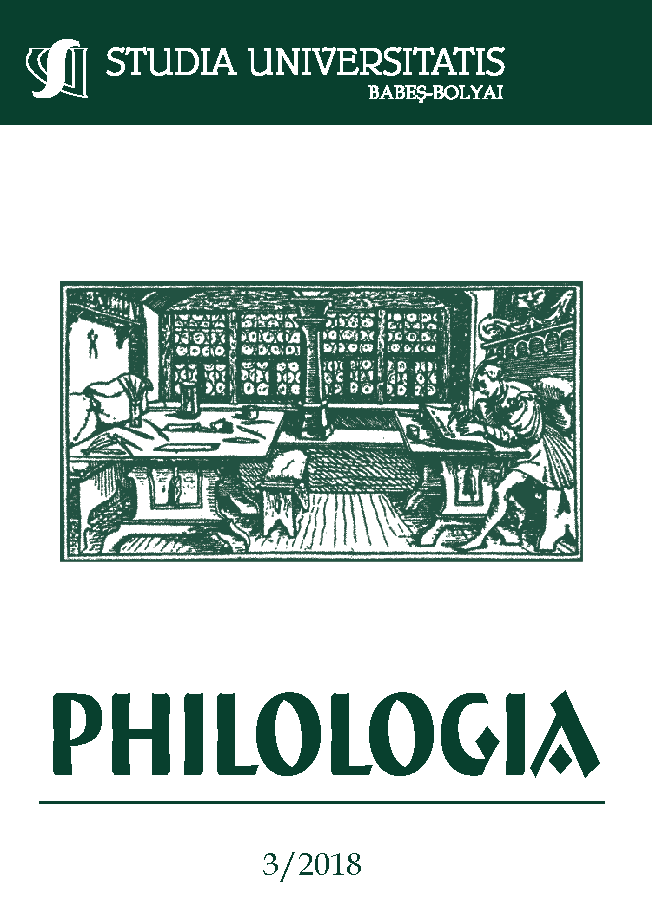MOTIVATION IN ENGLISH LANGUAGE LEARNING
DOI:
https://doi.org/10.24193/subbphilo.2018.3.16Keywords:
EFL, motivation, attitudes, ethnicity, Druze, Muslims, Christians.Abstract
Motivation in English Language Learning. The current study aims at investigating the relationship between the learners- integrative and instrumental motivation and English language among Arab EFL learners. Motivation plays an important part in improving and developing the learners’ communicative ability. Attitudinal studies conducted on Arab students, such as those of Zughoul and Taminian (1984), Salih (1980) and Harrison et al. (1975), have consistently shown that Arab students are instrumentally motivated to learn English, and that they are well aware of the utility of knowing English. This means that the main stimulus for learning English is instrumental, to achieve a goal or a career. It is true that some learners are integrative motivated, but they are in a minority.
Rezumat. Motivație în învățarea limbii engleze. Acest studiu investighează relaţia dintre motivaţia integrativă sau instrumentală şi studiul limbii engleze la arabii din Israel. Motivaţia joacă un rol important în dezvoltarea şi perfecţionarea abilităţii comunicative a studenţilor. Studii atitudinale facute asupra studenţilor arabi (ca cele ale lui Yughoul şi Taminian, 1984, Salih, 1980 şi Harrison et al., 1975) au arătat convingător că studenţii arabi sunt motivaţi instrumental să înveţe limba engleză pentru că sunt perfect conştienţi de utilitatea stăpânirii limbii engleze în contextul din Israel. Acest lucru demonstrează că principalul stimul pentru învăţarea limbii engleze este instrumental, acela de a atinge un scop sau de a garanta o carieră. Este adevărat că unii studenţi sunt motivaţi integrativ, dar acestia formează o minoritate.
Cuvinte cheie: Engleza ca limbă străină, atitudine, etnicitate, Druzi, Musulmani, Creştini.
References
Amara, M. H. (1999). Politics and Sociolinguistic Reflexes: Palestinian Border Villages. Ch. 1. Philadelphia: John Benjamin's Publishing Company.
Bachman, L.E., Palmer, A.S, (1982). The construct validation of some components of communicative proficiency. TESOL Quarterly, 16: 449–465.
Bourdieu, P. (1991). The Logic of Practice. London: Cambridge University Press.
Brosh, H. (1988). The Impact of Learning Spoken Arabic in Elementary Schools on Achievements in Literary Arabic in the Seventh Grade of the Intermediate School. Ph. D Thesis, Tel Aviv: University of Tel Aviv. [Hebrew]
Brown, H.D. (1987). Principles of Language Learning and Teaching. Englewood Cliffs, NJ: Prentice-Hall.
Cooper, R. L., & Fishman, J. A. (1977). A Study of Language Attitudes. In J. Fishman, R. Cooper, & A. Conrad (eds.), The Spread of English (pp. 239-273). Rowley, MA: Newbury House Publishers.
El-Dash, L. & Busnardo, J. (2001). Brazilian Attitudes towards English: Dimensions of Status and Solidarity. International Journal of Applied Linguistics, 11(1), 57-74.
Ellis, R. (1994). The Study of Second Language Acquisition. Oxford University Press.
Fishman, J. (1977). Language and Ethnicity. In H. Giles (ed.), Language and Ethnicity in Intergroup Relations (pp. 15-58). New York: Academic Press.
Gan, B., Menkhoff, T., Smith, R. (2015). Enhancing students’ learning process through interactive digital media: new opportunities for collaborative learning. Computers in Human Behavior, 51 (B): 652–663.
García-Peñalvo, F.J. (2015). Cómo entender el concepto de presencialidad en los procesos educativos en el siglo XXI. Education in the Knowledge Society (EKS), 16 (2): 6–12. http://dx.doi.org/10.14201/eks2015162612
Gardner, R.C. & Lambert, W.E. (1972). Attitudes and Motivation in Second Language Learning. Rowley, Mass: Newbury House.
Gardner, R. C. (1985). Social Psychology and Second Language Learning: The Role of Attitudes and Motivation. London & Baltimore, MD: Edward Arnold.
Giles, H. & Johnson, P. (1987). Ethnolinguistic Identity Theory: A Social Psychological Approach to Language Maintenance. International Journal of the Sociology of Languages, 68, 256-269.
González, A. B., Rodríguez-Conde, M.J., Olmos-Migueláñez, S., Borham, M., García-Peñalvo, F.J. (2013). Experimental evaluation of the impact of b-learning methodologies on engineering students in Spain. Computers in Human Behavior, 29 (2): 370–377. http://dx.doi.org/10.1016/j.chb.2012.02.003
Harrison, W., Prator, C., & Tuker G. R. (1975). English Language Policy: Survey of Jordan: A Case Study in Language Planning. Arlington: Center for Applied Linguistics.
McDonough, S. (1983). Psychology in Foreign Language Teaching. London: George Allen & Unwin.
Midraj, S., Midraj, J., O'Neill, G. & Sellami, A. (2008). The Affective Factors and English Language Attainment of Arab EFL Learners. International Journal of Applied Educational Studies. (Online) Retrieved 26 October, 2008.
Phinney, J. S. (1995). Ethnic Identity and Self Esteem: Review and Integration. In A. Padilla (ed.), Hispanic Psychology: Critical Issues in Theory and Research (pp. 57-70). Thousand Oaks, CA: Sage.
Pinto-Llorente, A.M., Sánchez-Gómez, M.C., García-Peñalvo, F.J. (2015). To Be or not to Be successful? that does not only depend on technology, but also on human factors. Journal of Cases on Information Technology, 17 (1): 51–69.
Rahman, T. (2002). Languages, Ideology and Power: Language Learning among Muslims of Pakistan and North India. Oxford: Oxford University Press.
Sánchez-Gómez, M.C., Pinto-Llorente, A.M., García-Peñalvo, F.J. (2010). Blended learning University students’ perception of digital competence. Proceedings of the Conference on European Applied Business Research (EABR) and European College Teaching & Learning (ETLC), Ireland, Dublin.
Schumann, J. H. (1978). Social and Psychological Factors in Second Language Acquisition. In J. C. Richards (ed.), Understanding Second and Foreign Language Learning: Issues and Approaches (pp.163-178). Rowley: Newbury House.
Seedhouse, P. (1996). Classroom Interaction: Possibilities and Impossibilities. ELT Journal, 50 (1),16-24.
Thorne, A. (2003). Personal memory telling and personality development. Personality and Social Psychology Review, 4 45-56.
Yashima, T., Zenuk-Nishide, L. & Shimize, K. (2004). The Influence of Attitude and Affect on Willingness to Communicate and Second Language Communication. Language Learning, 54, 119-152.
Downloads
Published
How to Cite
Issue
Section
License
Copyright (c) 2018 Studia Universitatis Babeș-Bolyai Philologia

This work is licensed under a Creative Commons Attribution-NonCommercial-NoDerivatives 4.0 International License.



